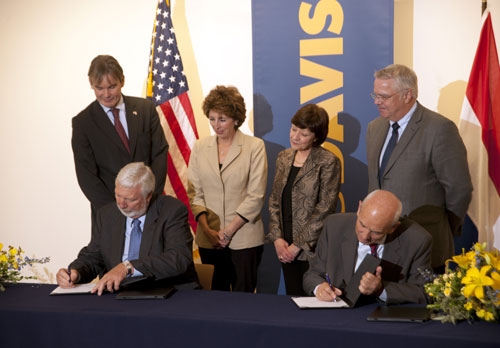Nov 10, 2011

Front row, from left: Neal Van Alfen, Aalt Dijkhuizen. Back row, standing, from left: Bart van Bolhuis, Linda Katehi, Karen, Ross, Chris Buijink.
With a global population that now tallies 7 billion, scientists and thought leaders worldwide are resolutely determining how to sustainably feed the additional 2 billion people who are expected to arrive in the next 40 years, while maintaining environmental quality and human nutrition and well-being.
“We are facing challenging times,” said Aalt Dijkhuizen, president and chairman of Wageningen UR. “We have to increase food production while decreasing the environmental footprint. That is a major global challenge.”
“This partnership will allow two of the best institutions in the world to address the challenges of environmental quality and food production,” added Neal Van Alfen, dean of the UC Davis College of Agricultural and Environmental Sciences. “Together we will form worldwide networks with other universities, government institutions and especially with businesses that can implement new research technologies. We will develop solutions that really have an impact.”
In addition to Van Alfen, UC Davis and California were represented at the signing by UC Davis Chancellor Linda Katehi and Karen Ross, secretary of the California Department of Food and Agriculture. Dijkhuizen was joined by Secretary-General Chris Buijink of the Netherlands Ministry of Economic Affairs, Agriculture and Innovation, and Netherlands Consul General Bart van Bolhuis to represent Wageningen UR and the Netherlands.
“This partnership will bring lead scientists, businesses and government partners together to provide science-based answers, innovations and sound policy that benefit the public,” Katehi said. She stressed the need for scientists to help develop public policy.
Dijkhuizen noted that this “golden triangle” of private industry, government and university research institutions is an effective way to implement scientific technologies and innovations.
The CDFA secretary and Netherlands secretary-general highlighted the need for government in this partnership. Ross stressed the agricultural production and nutrition components of the agreement, and how they will benefit the health and well-being of general consumers, while assuring a strong agricultural future in California. Buijink said that job growth, which benefits everyone, will be a critical outcome of extending the research information and technologies to business partners in food-production, agricultural and environmental industries.
Water is a major issue related to food production and environmental quality, not only in the U.S. and the Netherlands but throughout the world and especially in developing areas. The consul general said that water issues will be at the forefront of research between the institutions.
“Research that addresses water-saving technologies in agriculture will help create new irrigation and water-storage innovations that benefit farmers, consumers and everyone who has a stake in water issues,” said van Bolhuis.
This agreement between UC Davis and Wageningen UR will address the pressing global issues of population growth, food security and environmental sustainability through research on efficient production and postharvest technologies, reduced energy and environmental inputs, and scientific breakthroughs in areas such as genomics, biotechnology and new biofuels.
The agreement will also establish scholarly exchange programs for students and postdoctoral scholars between the two universities in order to expand knowledge of global issues and technologies related to food, agriculture and the environment. The courses and workshops will provide leadership opportunities for students and postdocs who will go on to become scientists, decision makers and leaders in businesses, government, universities and other organizations.
###